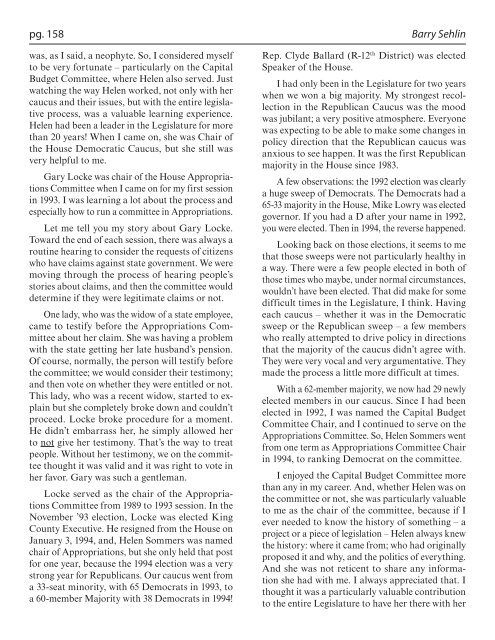Helen Sommers: An Oral History
Helen Sommers: An Oral History
Helen Sommers: An Oral History
Create successful ePaper yourself
Turn your PDF publications into a flip-book with our unique Google optimized e-Paper software.
pg. 158 Barry Sehlin<br />
was, as I said, a neophyte. So, I considered myself<br />
to be very fortunate – particularly on the Capital<br />
Budget Committee, where <strong>Helen</strong> also served. Just<br />
watching the way <strong>Helen</strong> worked, not only with her<br />
caucus and their issues, but with the entire legislative<br />
process, was a valuable learning experience.<br />
<strong>Helen</strong> had been a leader in the Legislature for more<br />
than 20 years! When I came on, she was Chair of<br />
the House Democratic Caucus, but she still was<br />
very helpful to me.<br />
Gary Locke was chair of the House Appropriations<br />
Committee when I came on for my first session<br />
in 1993. I was learning a lot about the process and<br />
especially how to run a committee in Appropriations.<br />
Let me tell you my story about Gary Locke.<br />
Toward the end of each session, there was always a<br />
routine hearing to consider the requests of citizens<br />
who have claims against state government. We were<br />
moving through the process of hearing people’s<br />
stories about claims, and then the committee would<br />
determine if they were legitimate claims or not.<br />
One lady, who was the widow of a state employee,<br />
came to testify before the Appropriations Committee<br />
about her claim. She was having a problem<br />
with the state getting her late husband’s pension.<br />
Of course, normally, the person will testify before<br />
the committee; we would consider their testimony;<br />
and then vote on whether they were entitled or not.<br />
This lady, who was a recent widow, started to explain<br />
but she completely broke down and couldn’t<br />
proceed. Locke broke procedure for a moment.<br />
He didn’t embarrass her, he simply allowed her<br />
to not give her testimony. That’s the way to treat<br />
people. Without her testimony, we on the committee<br />
thought it was valid and it was right to vote in<br />
her favor. Gary was such a gentleman.<br />
Locke served as the chair of the Appropriations<br />
Committee from 1989 to 1993 session. In the<br />
November ’93 election, Locke was elected King<br />
County Executive. He resigned from the House on<br />
January 3, 1994, and, <strong>Helen</strong> <strong>Sommers</strong> was named<br />
chair of Appropriations, but she only held that post<br />
for one year, because the 1994 election was a very<br />
strong year for Republicans. Our caucus went from<br />
a 33-seat minority, with 65 Democrats in 1993, to<br />
a 60-member Majority with 38 Democrats in 1994!<br />
Rep. Clyde Ballard (R-12 th District) was elected<br />
Speaker of the House.<br />
I had only been in the Legislature for two years<br />
when we won a big majority. My strongest recollection<br />
in the Republican Caucus was the mood<br />
was jubilant; a very positive atmosphere. Everyone<br />
was expecting to be able to make some changes in<br />
policy direction that the Republican caucus was<br />
anxious to see happen. It was the first Republican<br />
majority in the House since 1983.<br />
A few observations: the 1992 election was clearly<br />
a huge sweep of Democrats. The Democrats had a<br />
65-33 majority in the House, Mike Lowry was elected<br />
governor. If you had a D after your name in 1992,<br />
you were elected. Then in 1994, the reverse happened.<br />
Looking back on those elections, it seems to me<br />
that those sweeps were not particularly healthy in<br />
a way. There were a few people elected in both of<br />
those times who maybe, under normal circumstances,<br />
wouldn’t have been elected. That did make for some<br />
difficult times in the Legislature, I think. Having<br />
each caucus – whether it was in the Democratic<br />
sweep or the Republican sweep – a few members<br />
who really attempted to drive policy in directions<br />
that the majority of the caucus didn’t agree with.<br />
They were very vocal and very argumentative. They<br />
made the process a little more difficult at times.<br />
With a 62-member majority, we now had 29 newly<br />
elected members in our caucus. Since I had been<br />
elected in 1992, I was named the Capital Budget<br />
Committee Chair, and I continued to serve on the<br />
Appropriations Committee. So, <strong>Helen</strong> <strong>Sommers</strong> went<br />
from one term as Appropriations Committee Chair<br />
in 1994, to ranking Democrat on the committee.<br />
I enjoyed the Capital Budget Committee more<br />
than any in my career. <strong>An</strong>d, whether <strong>Helen</strong> was on<br />
the committee or not, she was particularly valuable<br />
to me as the chair of the committee, because if I<br />
ever needed to know the history of something – a<br />
project or a piece of legislation – <strong>Helen</strong> always knew<br />
the history: where it came from; who had originally<br />
proposed it and why, and the politics of everything.<br />
<strong>An</strong>d she was not reticent to share any information<br />
she had with me. I always appreciated that. I<br />
thought it was a particularly valuable contribution<br />
to the entire Legislature to have her there with her
















